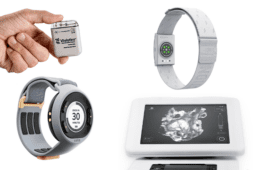AdaptivCRT Algorithm Customizes Therapy for Heart Failure Patients and Improves Their Response Rates
Medtronic, Inc. has announced the U.S. Food and Drug Administration (FDA) approval of its newest cardiac resynchronization therapy-pacemaker, Viva CRT-P, for indicated patients with heart failure or atrioventricular (AV) block.
The Viva CRT-P includes the Medtronic-exclusive AdaptivCRT algorithm, which preserves normal heart rhythms and automatically adjusts to the patient’s needs, creating a customized therapy for each patient. It is the only algorithm demonstrated to improve heart failure patients’ response to the therapy1 and reduce the risk of atrial fibrillation, or AF (as compared to conventional biventricular therapy)2. Recent data also show the AdaptivCRT algorithm reduced 30-day hospital readmissions for heart failure by 47 percent3 and AF-related healthcare utilizations (hospitalizations, emergency department or clinic visits) by 55 percent4 – important benefits since heart failure is a costly problem and represents a leading cause of 30-day hospital readmissions5.
“With the AdaptivCRT algorithm, Viva CRT-P is personalized to the individual patient, adjusting to their needs minute-by-minute,” said Daniel Lustgarten, M.D., medical director, Cardiac Electrophysiology Research Laboratory, Fletcher Allen Cardiology, and associate professor, University of Vermont College of Medicine. “With this important new system, patients may respond better to cardiac resynchronization therapy, allowing them to resume daily activities and avoid additional hospitalizations.”
Key findings from the AdaptivCRT Trial and sub-analyses have validated the benefits of the algorithm, including:
- For patients with normal AV conduction, AdaptivCRT showed an increase in CRT response rate of 12 percent at six months1;
- Patients with AdaptivCRT demonstrated a 21 percent reduction in heart failure hospitalizations at one year as compared to historical CRT trials6;
- Patients with AdaptivCRT demonstrated a 46 percent reduced risk of AF2 at two years.
Viva CRT-P also features advanced diagnostics tools, such as OptiVol Fluid Status Monitoring and Cardiac Compass Report, which provide unmatched levels of insight into patients’ physiological condition. These tools are demonstrated to identify patients at risk for rehospitalization within 30 days of discharge7, a critical quality measure.
“Our aim is to help people living with heart failure by making cardiac resynchronization therapy even better, through research and improved therapies,” said David Steinhaus, M.D., vice president and general manager, Heart Failure, and medical director for the Cardiac Rhythm and Heart Failure Management business at Medtronic. “The addition of Viva CRT-P to our U.S. portfolio reinforces our commitment to making CRT treatment even more powerful by improving care for patients, reducing complications and ultimately reducing costs.”
Medtronic CRT devices have been safely and effectively used for more than a decade to treat patients with mildly symptomatic, moderate or severe heart failure, and more recently for some patients with AV block and reduced ejection fraction, a measure of pumping function.
Heart failure affects 5.1 million Americans8 and results in more than 1 million hospitalizations yearly9.
In collaboration with leading clinicians, researchers and scientists worldwide, Medtronic offers the broadest range of innovative medical technology for the interventional and surgical treatment of cardiovascular disease and cardiac arrhythmias. The company strives to offer products and services that deliver clinical and economic value to healthcare consumers and providers around the world.
1 Birnie D, Lemke B, Aonuma K, et al. Clinical outcomes with synchronized left ventricular pacing: Analysis of the adaptive CRT trial. Heart Rhythm. September 2013;10(9):1368-1374.
2 Martin D, et al. Can Adaptive Cardiac Resynchronization Therapy Reduce Atrial Fibrillation Risk? Circulation. 2013;128(22S):A17740.
3 Starling RC, et al. Impact of Novel Adaptive Optimization Algorithms on 30-day Readmissions: Evidence from the Adaptive CRT Trial. Heart Rhythm 2014;11(5)(suppl):S155.
4 Lemke B, et al. Atrial Fibrillation Resource Use with an Adaptive Device Algorithm. June 2014, Cardiostim, Nice, France.
5 Elixhauser A., Steiner C. Readmissions to U.S. Hospitals by Diagnosis, 2010. Healthcare Cost and Utilization Project, Statistical Brief #153. Agency for Healthcare Research and Quality. 2013
6 Tarab AD, Dougher CE, Rogers TB, et al. Budget impact of selecting cardiac resynchronization therapy (CRT) devices with adaptive (“aCRT”) programming algorithms under the United States Medicare Payment Setting. Value in Health. November 2012;15(7):A349.
7 Whellan DJ, Sarkar S, Koehler J, et al. Development of a method to risk stratify patients with heart failure for 30-day readmission using implantable device diagnostics. Am J Cardiol. 2013;111(1):79-84.
8 Go AS., Mozaffarian D., Roger VL., Benjamin EJ., Berry JD., et al. Heart disease and stroke statistics-2013 update: a report from the American Heart Association. Circulation 2013;127:e6-e245
9 Hall MJ., Levant S., DeFrances CJ. Hospitalization for congestive heart failure: United States, 2000-2010. NCHS data brief, no 108. Hyattsville, MD: National Center for Health Statistics. 2012.




